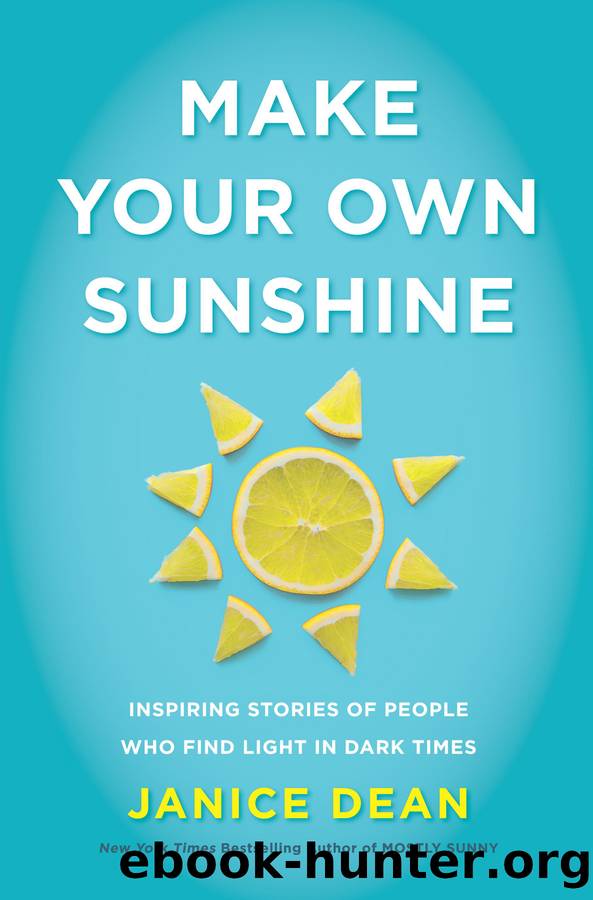Make Your Own Sunshine by Janice Dean

Author:Janice Dean
Language: eng
Format: epub
Publisher: Harper
Published: 2021-01-02T00:00:00+00:00
Chapter 11
Give Early, Give Often
If youâre a parent, what do you wish most for your kids? Of course, we want them to do well in school, have friends, be happy, and succeed in whatever they choose. But what about wishing for our children to grow up being kind?
I read a recent study where children were asked what they believed their parents were concerned about as they grew up. Their responses mostly said they thought their mom and dad wanted them to be achievers instead of being kind or good at caring for others.
In other words, they believed their parents were prouder of things like good grades or sports than if they were a kind person in their class or school.
Achievements are great, but being kind also has a big impact on growth and behavior heading into adulthood.
A good example of this is a video I saw a few months ago that had me in a puddle of tears. It was two friends playing baseball on opposing teams. One kid was pitching against his childhood friend who struck out, ending the game. The pitcherâs teammates ran into the field to celebrate, while the pitcher decided to run over to his friend and hug him, instead. I saw an interview with the boy who struck out afterward, and he said although the loss of the game was disappointing, it was the kindness of his buddy coming over to embrace him that he would remember for the rest of his life.
That kind of empathy and kindness should be celebrated as well. What can we do as parents to foster that kind of reaction in our children?
Showing your kids that you practice what you preach is a start. You can also tell them, instead of âI want you to be happyâ or âDo well on that test,â âDonât forget to be kind to others.â Studies show that those who express gratitude are more likely to be kind, helpful, compassionate, and forgiving later in life.
Dr. Robert Emmons is a professor of psychology at the University of California and is a leading scientific expert on gratitude. He writes: âI think gratitude allows us to participate more in life. We notice the positives more, and that magnifies the pleasures you get from life. Instead of adapting to goodness, we celebrate goodness. We spend so much time watching thingsâmovies, computer screens, sportsâbut with gratitude we become greater participants in our lives as opposed to spectators.â
Dr. Emmons uses an example of a woman in Vancouver whose family put their spare change in gratitude jars at the end of the day. By doing this, they gave themselves a regular reminder to focus on gratitude. When the jar was full, they gave the money to a good cause in the community.
Practices like this not only teach children the importance of gratitude but can show that gratitude compels people to âpay it forwardââto give to others in some measure like they themselves have received. Your hard work will come back to you in your childrenâs behavior.
Download
This site does not store any files on its server. We only index and link to content provided by other sites. Please contact the content providers to delete copyright contents if any and email us, we'll remove relevant links or contents immediately.
Effortless by Greg McKeown(1175)
Beyond Order by Jordan B. Peterson;(1062)
Word Power Made Easy by Norman Lewis(1061)
How to Not Die Alone by Logan Ury(830)
Master of One by Jordan Raynor(809)
100 Things Successful People Do by Nigel Cumberland(799)
Chatter by Ethan Kross(799)
So Good They Can't Ignore You by Cal Newport(741)
Lives of the Stoics by Ryan Holiday & Stephen Hanselman(720)
The Art and Science of Results by Joe Vitale(711)
Napolean Hill Collection by Napoleon Hill(706)
Be Your Best Self by Mike Bayer(686)
Kinesic Magic by Donald Tyson(670)
Career Fear (and how to beat it) by Somi Arian(662)
Friday Forward by Robert Glazer(659)
The 7 Habits on the Go by Stephen R. Covey(647)
The Power of 100! by Shaun King(643)
The Practice Is the Path by Tias Little(630)
The Most Powerful You by Kathy Caprino(603)
